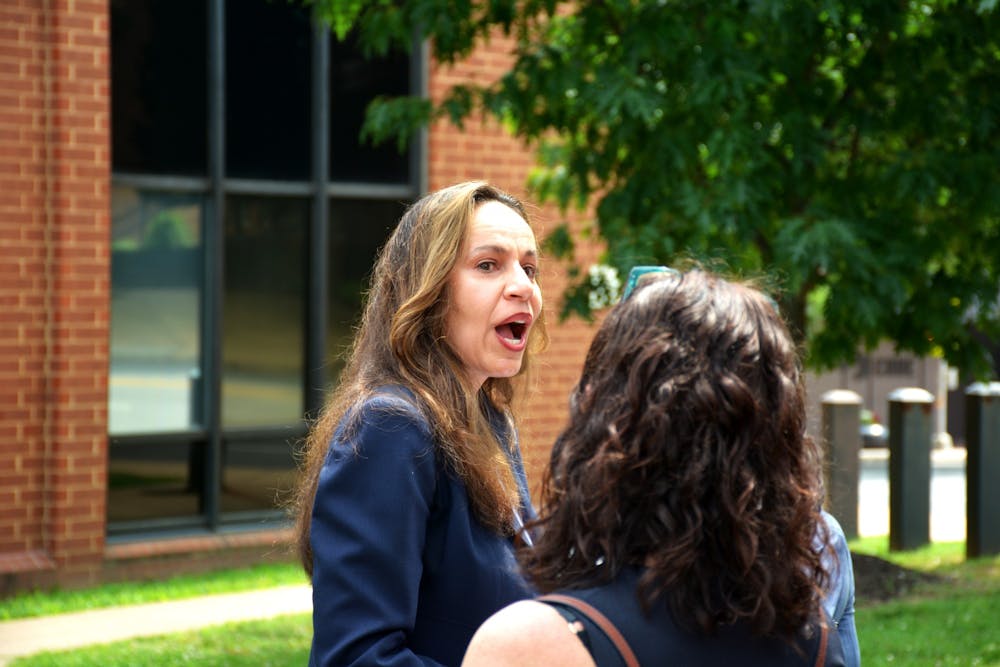Former chief of the Charlottesville Police Department RaShall Brackney announced she is suing the the City of Charlottesville for gender and racial discrimination at a press conference Wednesday morning. Brackney was first hired by CPD in 2018 and served as chief for over three years before her contracted was was terminated in September.
Brackney was accompanied by her attorney Charles Tucker, who said they approached the City “months ago” and gave them 180 days to respond to Brackney’s claims. In November, Brackney filed a complaint with the U.S. Equal Employment Opportunity Commission and demanded $3 million from the City for her claim of wrongful termination prior to the official lawsuit.
The City, Tucker said, did not contact him. On Tuesday evening, Tucker officially filed a $10 million lawsuit alleging racial and gender discrimination as well as interference, retaliation, defamation and violation of the Freedom of Information Act, which requires disclosure of government information and documents upon request.
Defendants named in the lawsuit include not only the City of Charlottesville, but former city manager Chip Boyles, Charlottesville City attorney Lisa Robertson, acting Chief of Police Tito Durette, former City Council member Heather Hill, current City Council member Sena Magill and Mayor Lloyd Snook.
It was Boyles who made the decision to terminate Brackney’s contract with the City in his capacity as city manager — though he did not provide a reason for Brackney’s termination publicly, Boyles said the decision came after the results of a police department survey revealed a majority of police officers thought the department lacked leadership. Boyles resigned over a month later in October, eight months after he had been hired.
Tucker alleged that the defendants had engaged in a “months-long conspiracy” to remove her as chief — in the final 90 days of her employment, Tucker said, her access to department facilities was disconnected, her name and biography was removed from the department website and her photo was removed from the lobby of the police department, “all while she was still serving as chief.”
Tucker characterized the survey as a “hit job” targeted at Brackney after she conducted an internal investigation in the department and found “racist, violent and deeply unprofessional” behavior among officers. The behavior, also detailed in a release from CPD in August following the survey results, included violent texts about “killing the command officers” and praise for “impregnating a trainee officer.”
In June of 2021, Brackney was also sent a video of a corporal and SWAT team member using profanity taken in April 2020. In response, Brackney dissolved the SWAT team and fired an officer. Two more resigned.
“[The defendants] tried to dismiss obviously unacceptable behavior these officers were engaged in as nothing concerning at all, so they just could use Dr. Brackney's reaction as an excuse to fire her as chief of police,” Tucker said at the press conference.
When Brackney tried to “bring their defamation to light,” Tucker said, the defendants “manipulated drafts” and failed to produce documents to “cover up their plot against her.”
“Once again, none of our white male employees being terminated was ever treated this way,” Tucker said. “[Brackney] was fired for being a Black woman who was trying to reform a police department that simply did not want to be reformed.”
Brackney said she had submitted “more than 50 [FOIA requests]” and “spen[t] hundreds of dollars” to uncover the plan to fire her, as well as going through recordings from meetings between her and government leadership, including Boyles.
“The City of Charlottesville and CPD is still so invested in its racial paternalism, misogyny and nepotism that they would rather conspire to oust me than dismantle or confront corrupt, violent individuals in CPD and still in city government,” Brackney said.
Brackney went on to read a series of texts exchanged between officers discovered in her internal investigation. In one text, an officer allegedly said they were “excited to do hoodrat s—t” and hoped for violence, as well as officers bragging about concealing actions from their body cameras.
“[Defendants] knew officers were involved in the most vile behavior, and still they protected them,” Brackney said. “They emboldened them. They embraced them. They supported them.”
Brackney also addressed a question about a City employee who had allegedly attended the January 6 Capitol riots — in a tweet posted June 9, Brackney said she reported the employee to the Federal Bureau of Investigation after CPD determined the issue was “not a ‘crime’ but a ‘personnel’ matter.” Brackney declined to release the name of the employee, citing concerns about interfering with a possible investigation.
The conference closed with Brackney urging citizens to read the lawsuit — which will be released within the next few days — and contact the Department of Justice and Richmond FBI to investigate CPD for a pattern or practice case of discrimination.
This is an ongoing story.







